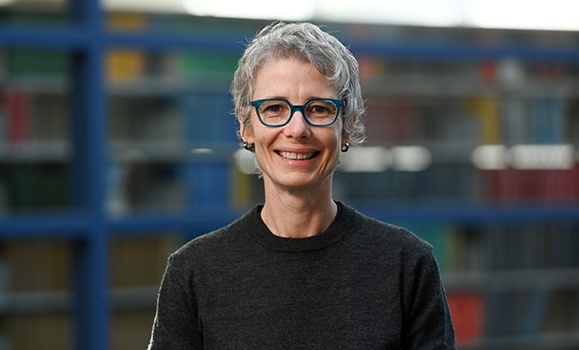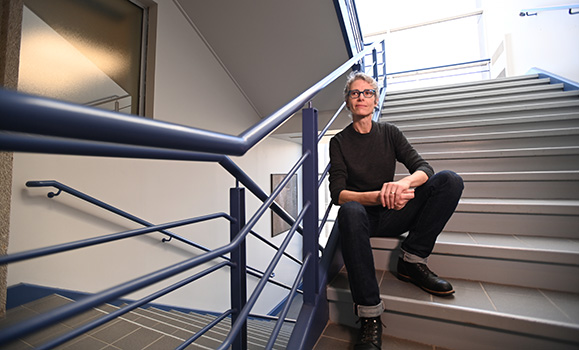News
» Go to news mainDr. Elaine Craig Wins Prestigious Killam Fellowship

This story originally appeared in Dal News.
���ϳԹ���legal scholar Dr. Elaine Craig was announced Tuesday (March 19) as one of eight Canadian researchers to receive the Dorothy Killam Fellowship, one of the most esteemed academic awards in the country.
Dr. Craig joins the ranks of just nine ���ϳԹ���researchers to have received the award since 1969 and is the first from the university’s��Schulich School of Law.��Dorothy Killam Fellowships grant $160,000 over two years to researchers pursuing projects of broad significance so they can focus on and accelerate the pace of their work.
For Dr. Craig, the award is particularly significant as it will support her study aimed at understanding why so many sexual assault cases fail to progress to trial, how we can improve their investigation and prosecution, and why reforms to this area of law have failed to achieve many of their objectives.
An unprecedented investigation
To pursue her work, Dr. Craig will study hundreds of closed sexual offence files produced in Nova Scotia over a three-year period ending in 2022. The cases include both complaints that did and did not go to trial. Pursued in collaboration with the����(NSPPS), Dr. Craig is the first legal scholar in Canada to conduct a study that relies on closed files to gain this kind of empirical knowledge.
Dr. Craig says the project will provide detailed knowledge regarding virtually every stage of the legal process, from the time a sexual assault complainant reports until the point at which their case is over, noting that this is knowledge currently unavailable to the public in any jurisdiction in Canada.
“There is so much we do not know and, as researchers, we have very few avenues to access many aspects of the legal process. Even when cases reach the courts, the vast majority of sexual offence prosecutions, more than 80 per cent, do not result in reported decisions,” says Dr. Craig. “We don't even know they're happening unless they are reported by media sitting in the courtroom.”
In addition to case files, Dr. Craig will interview crown prosecutors and study trial transcripts. She acknowledges the value of the partnership which offers the foundation for the study, saying, “this project was designed in collaboration with the NSPPS and is only possible due to a shared interest in better understanding the legal process regarding sexual offences.”
Addressing the justice gap
Dr. Craig notes that there have been decades of law reforms in Canada aimed at eliminating discriminatory stereotypes and practices from Canadian sexual assault law. But she says that the reforms have produced little in terms of increasing rates of reporting and reducing attrition and that complainants continue to experience the criminal justice system as traumatic.
She says that to understand what is causing the ‘justice gap’ we need to bridge the knowledge gap. Among other things, she says we need to better understand the factors that lead to a drop-off in the progression of sexual assault cases through the legal system. We also need to understand how frequently complainants are provided testimonial aids, such as screens to shield them from the accused, and the frequency with which defence counsels gain permission to introduce evidence of a complainant's sexual activity or private records.
She also notes that while it’s well known that Indigenous women are sexually assaulted at disproportionately higher rates, we are unaware of their rates of representation as complainants in sexual assault trials.

Living up to expectations
Dr. Craig says the period of focus of her study — between 2019 and 2022 — is particularly important as it follows substantial changes to sexual assault law to reduce the negative impact on complainants during sexual assault proceedings. One change included increasing the involvement of complainants in deciding if their sexual activity is admissible as evidence.
“This study will be able to look at whether those changes are helping to make the legal process more humane and less harmful for sexual assault survivors,” says Dr. Craig.
Ultimately, she hopes her findings, which she expects to begin publishing within a year or two, will help improve the process and treatment for victims of sexual assault.
“My goal is to make a difference for people going through the process of reporting sexual violations in Nova Scotia, and indirectly in other provinces in Canada,” she says. “I fully expect the research will yield insights and knowledge that will improve the investigative stage, the prosecution stage and the adjudicative stage of the sexual offence legal process in Canada, and that will be of use to legal actors across the country.”
View Dr. Elaine Craig's�������Ի���her Faculty profile��on the Schulich School of Law website.
Previous Killam Fellowship Winners at Dal
| Winner | Field of Study | Year |
|---|---|---|
| Dr. Donald Weaver | Medicine | 2010 |
| Dr. Ian Meinertzhagen | Psychology | 2007 |
| Dr. Axel Becke | Chemistry | 2005 |
| Dr. Neil Burford | Chemistry | 2003 |
| Dr. Brian Hall | Biology | 2003 |
| Dr. Roderick Wasylishen | Chemistry | 1995 |
| Dr. Gilbert Winham | Political Science | 1988 |
| Dr. Karen Mann | Biology | 1980 |
| Dr. Roy Haines | History | 1978 |
| Dr. Roy Haines | Medicine |
1977 |
��
Recent News
- Professor Elaine Craig ft in "2024: The year as told through some of Dal’s biggest stories"
- Associate Professor Olabisi D. Akinkugbe ft in "Idigbe Celebrates Father’s 100th Birthday with Commissioning of PAS World Centre"
- Preparing to Get LAWST AT SEA
- Assistant Professor Andrew Flavelle Martin cited in "Supreme Court of Canada Judgement re: Quebec (Attorney General) v. Pekuakamiulnuatsh Takuhikan"
- Associate Professor Jodi Lazare quoted in “Debate Continued in Senate, Bill to Amend Health of Animals Act – Fourteenth Report of Agriculture and Forestry Committee"
- Inspiring Kids to Believe that Caring Can Be Cool
- Professor Camille Cameron ft in "Can Big Oil be made to pay like Big Tobacco?"
- DLAS Community Legal Worker Mark Culligan ft in "91 residents of N.S. mobile home park file for return of 'unlawful' water charges"
